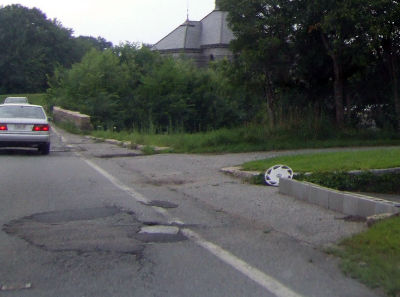How to Report and Seek Change for Dangerous Road Conditions
The Interstate System throughout the U.S. is over 46,000 miles long. With millions of cars traveling our roadways each day, through all types of weather, it's no surprise that our roads need upkeep from time to time.
The Interstate System is not the only collection of roads that need work, look around your community, and there are probably many neighborhood streets with potholes and even bridges that need repair.
Problematic Road

Every year, drivers hit giant potholes on the road, despite trying to avoid them. In some cases, when trying to swerve away from a pothole, a collision may occur with another motorist. Potholes and other issues in the road are not only an eyesore but cost drivers money every year. U.S. drivers, on average, spend a total of $3 billion on car repairs due to potholes and poor road conditions.
In addition to potholes, many roads have cracks, no clear lane and shoulder markings, and inadequate guardrails on overpasses and curves in the road. All of these things are potential contributors to fatal accidents.
Reporting Bad Roads
During your daily commute, it's easy to forget about every bump you hit along the way and over time you probably pay less attention to the condition of the road. Think of our roadways as a community. If there were something wrong going on in your neighborhood, you'd report it, right?
A pothole, a visual obstruction, and even debris left on the road are worth reporting, not only for your safety but for fellow motorists. If you come across some damage, make a mental note or pull over safely to write down information or make a phone call. Don't call anyone about the damage as you're driving.
If you're in an area with little to no traffic, take a picture if you can do so without interrupting traffic or compromising your safety. Take note of where the damage is, the date and time, and any other helpful details. If it's on a city street, contact your city offices. If you're on a highway, contact your state's Department of Transportation (DOT).
Seek Change
Even if you report a road that's in poor condition, it may take awhile to see any changes. Don't be afraid to be persistent, especially after a few months have passed. It's important to note that when you come across some road damage, don't be silent. Don't assume that another driver reported the issue already.
So, why are the roads in such bad shape and why does it seem to take forever to see change? Budget is a big factor. Some states, like Rhode Island, have set aside billions of dollars for a budget to fix roads and bridges. Other states don't have the same kind of funding.
Unfortunately, lack of funding is an all too common problem across the U.S. Regardless of which state you live in, voice your concerns about road conditions. Talk and write to your state legislators. Attend meetings and events that talk about expansion and road construction in your area.
Get involved as much as you can. Even if you can't foot the multi-million dollar bill for fixing the roads, your concerns can spark action.
